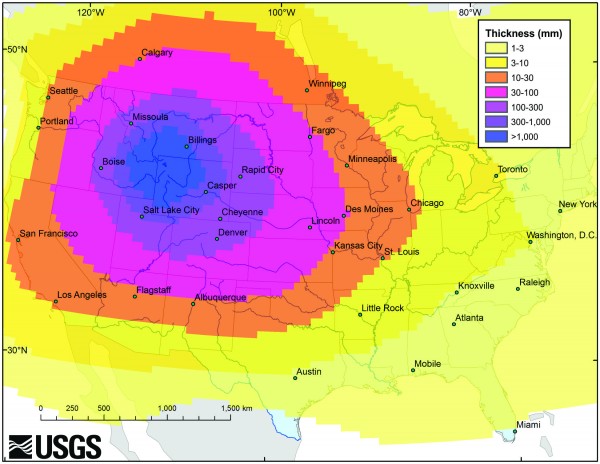EgonSpengler
Deity
- Joined
- Jun 26, 2014
- Messages
- 12,260
I'll throw a log onto the fire: A "supervolcano" eruption at Yellowstone National Park.
The eruption of Indonesia's Mount Tambora in 1815 and Mount Krakatoa in 1883 were merely "ultra plinian" eruptions, smaller in scale than a supervolcano. Tambora's eruption resulted in "The Year Without Summer" in New England and Western Europe, and Krakatoa's explosion has been described as the loudest sound ever, supposedly heard by people in Perth, 2000 miles away.
The USGS released a report this past Summer: Yellowstone supereruption would send ash across North America. According to them, the worst-case scenario would be an eruption of more than 1,000 cubic kilometers of material, an "umbrella cloud" so powerful it would defy existing air currents and spread across the entire continent (sorry, Canadians, you'd be going to Hell right along with us).

As for the short-term effects of volcanic ash,
"Even small accumulations [of volcanic ash] only millimeters or centimeters (less than an inch to an inch) thick could cause major effects around the country, including reduced traction on roads, shorted-out electrical transformers and respiratory problems, according to previous research cited in the new study. Prior research has also found that multiple inches of ash can damage buildings, block sewer and water lines, and disrupt livestock and crop production."
Power could be disrupted across the entire continent; imagine the 2003 blackout of the Eastern U.S., writ large. Emergency services would be overwhelmed; here again, we have a couple of case-studies in miniature, in Hurricane Katrina and Hurricane Sandy. Unlike those events, no help would be available from other parts of the country. Mid-term, it's not hard to imagine famine across the United States and Canada, with "dominoes" falling everywhere that imports agricultural products from either of those countries. Longer-term, the ash cloud would travel around the world, much as the cloud from Tambora did in 1816.
The eruption of Indonesia's Mount Tambora in 1815 and Mount Krakatoa in 1883 were merely "ultra plinian" eruptions, smaller in scale than a supervolcano. Tambora's eruption resulted in "The Year Without Summer" in New England and Western Europe, and Krakatoa's explosion has been described as the loudest sound ever, supposedly heard by people in Perth, 2000 miles away.
The USGS released a report this past Summer: Yellowstone supereruption would send ash across North America. According to them, the worst-case scenario would be an eruption of more than 1,000 cubic kilometers of material, an "umbrella cloud" so powerful it would defy existing air currents and spread across the entire continent (sorry, Canadians, you'd be going to Hell right along with us).

As for the short-term effects of volcanic ash,
"Even small accumulations [of volcanic ash] only millimeters or centimeters (less than an inch to an inch) thick could cause major effects around the country, including reduced traction on roads, shorted-out electrical transformers and respiratory problems, according to previous research cited in the new study. Prior research has also found that multiple inches of ash can damage buildings, block sewer and water lines, and disrupt livestock and crop production."
Power could be disrupted across the entire continent; imagine the 2003 blackout of the Eastern U.S., writ large. Emergency services would be overwhelmed; here again, we have a couple of case-studies in miniature, in Hurricane Katrina and Hurricane Sandy. Unlike those events, no help would be available from other parts of the country. Mid-term, it's not hard to imagine famine across the United States and Canada, with "dominoes" falling everywhere that imports agricultural products from either of those countries. Longer-term, the ash cloud would travel around the world, much as the cloud from Tambora did in 1816.


